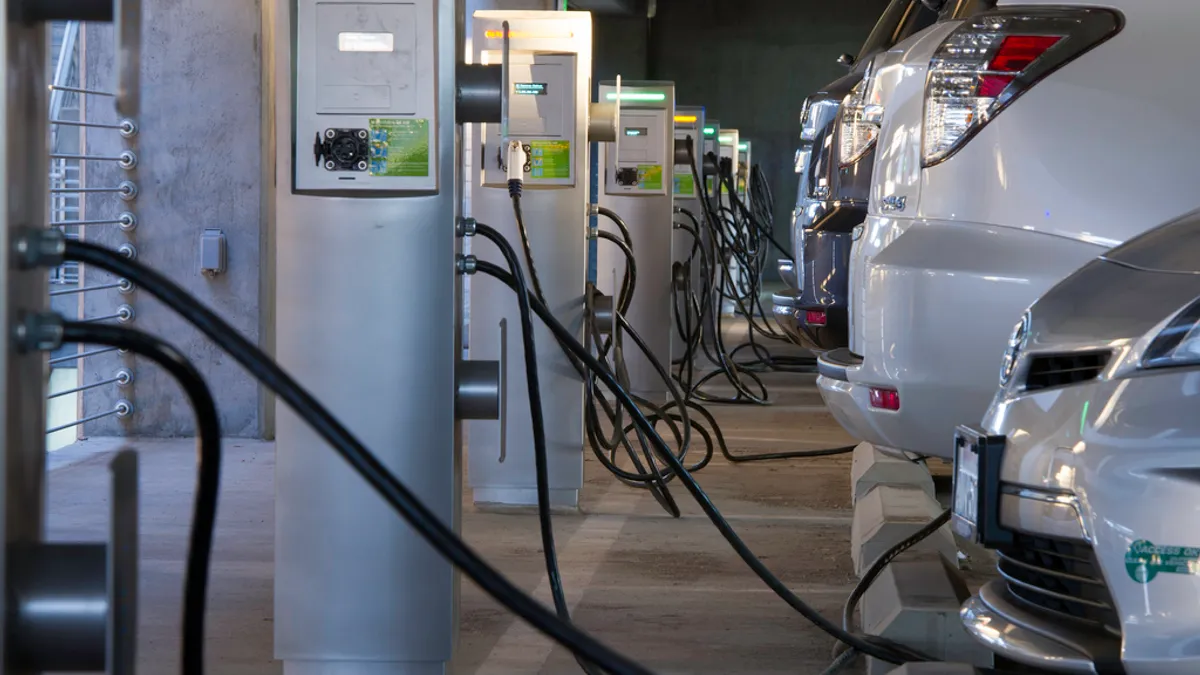Dive Brief:
-
Minnesota regulators on Monday stamped out manufacturing and petroleum groups' attempt to reverse approval of Xcel Energy's $25 million electric vehicle pilot program.
-
The state's Public Utilities Commission (PUC) approved the program in July, and five large industrial groups, including oil groups Marathon Petroleum and Flint Hills Resources, filed a petition with the commission on Aug. 6 asking regulators to reconsider the decision.
-
Those groups argued the commission did not have authority to regulate Xcel for behind-the-meter charging and raised general ratepayer concerns. EV and clean energy stakeholders were skeptical of the groups' involvement, noting that it may be the beginning of a longer fight between oil and electric power interests as EV adoption grows.
Dive Insight:
As electric vehicles strengthen in range and cheapen in price, some market watchers expect the fight to heat up between gas and electric power interests.
"We haven't really seen that [kind of complaint] in the market," Thomas Ashley, vice president of policy at Greenlots told Utility Dive, referring to the Minnesota intervention. "We may see more of that as more organizations that are not supportive of transportation electrification engage in the regulatory process, but that's really the first time we've seen it in a significant way like this."
The industrial groups maintain the concern was entirely ratepayer based, and independent of the groups' fuel interests.
"Really, this is a ratepayer question and that is, can the utility make investments behind the meter under Minnesota state law?" Andrew Moratzka, the attorney representing Xcel's large industrial customers in this case, told Utility Dive. "There's nothing there specific to the oil industry or specific to large industrial customers versus residential customers. This is a ratepayer general argument."
Despite the program being a smaller pilot, allowing Xcel to make that investment "establishes a precedent that could have long term impacts," Moratzka said.
The commission noted in its response to the group that it has "full rights" to regulate Xcel's behind-the-meter charging infrastructure as a utility, verging from the regulatory norm in other states.
Additionally, the commission said increased electric demand and time-of-use rates to encourage off-peak charging are considerations under Xcel's pilot that will ensure minimal costs to ratepayers within this pilot and beyond.
Large industrial customers have intervened in other Minnesota cases involving rates, including to oppose Xcel's Mankato natural gas plant purchase. But in that instance a number of other groups shared those concerns, including the state's attorney general's office and the Citizens Utility Board (CUB) of Minnesota. In this proceeding, the industrial groups were alone in their arguments.
The rollout of EVs under utilities "should be able to save all customers money by charging at off-peak times and moving toward time-of-use rates," Executive Director of Minnesota's CUB Annie Levenson-Falk told Utility Dive, adding that the commission seemed aware of those benefits for ratepayers.
Other clean energy groups also noted it was out of place for large industrial groups to make these arguments, but that the trend would likely not slow down as electric vehicles increase their share in the market.
"I think what we're seeing is primarily a rise of opposition that's generated out of the oil industry. We certainly saw that in Minnesota. And we're seeing it in other parts of the country," managing director at Advanced Energy Economy Matt Stanberry told Utility Dive. That opposition by "nontraditional actors" in these proceedings is primarily driven by the fact that the oil industry is beginning to see rapid EV adoption as "an existential threat to their business," he said.
Electric vehicles operating at 4 miles per kWh are 78% cheaper to fuel than the average gasoline-powered vehicle in the U.S., according to the Idaho National Laboratory.
"I've found that as you move forward, your opposition gets louder and shriller the better you're doing," Mark Nabong, senior attorney at the Natural Resources Defense Council told Utility Dive.
Xcel's pilot includes public charging and fleet charging, and the PUC also on Monday approved the utility's subscription EV pilot which will allow residential customers to charge their EVs off-peak for a flat monthly fee.
"Xcel Energy is a clean energy leader and our Minnesota electric vehicle plan is the largest and most broad utility transportation electrification program in the Midwest," an Xcel spokesperson told Utility Dive in an emailed statement. "We are pleased with the Commission's decision and will continue to move forward with our innovative electric vehicle pilot programs."















